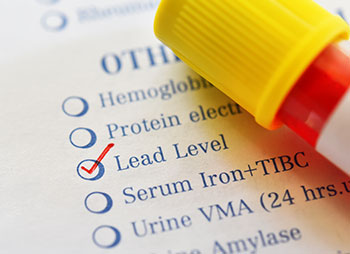
In this article, you will discover:
- The legal requirements for proving lead poisoning in Illinois
- What you should do if you suspect lead poisoning
- Evidence necessary to strengthen a lead poisoning case in Illinois
The Legal Requirements For Proving Lead Poisoning In Illinois
The main requirements for proving lead poisoning in Illinois are as follows:
- You live in a rented home or an apartment where someone else is responsible for ensuring there isn’t lead in the dwelling.
- Someone in your household suffered lead poisoning as a result of lead in the house or apartment.
- There is proof that the lead poisoning came from that specific house or apartment, not another source.
Typically, you’ll need lead testing to show the presence of lead in the dwelling. You also need medical test results showing lead in a child’s bloodstream. That test is typically done as part of child wellness checkups.
First Steps To Take If You Suspect Lead Exposure
Lead poisoning cases almost exclusively impact children for two reasons. First, they get lead in their system, usually through ingestion or by eating it. Second, in most cases, a small child crawls around on the floor and picks up lead dust from the carpet or walls. This situation typically happens in old houses where lead paint wasn’t removed.
A doctor should examine your child if you suspect lead poisoning. Blood tests are done as a matter of course. Most parents aren’t aware their child has lead poisoning until a doctor tells them.
The science of lead poisoning continues to evolve. Lead is measured in micrograms per deciliter. Previously, anything below 10 micrograms per deciliter was deemed acceptable. That threshold is steadily decreasing. Today, any level above five micrograms per deciliter can be potentially harmful.
After you see a doctor, contact an attorney as soon as possible. An attorney will help you through the process of getting your home tested for lead. Unless your landlord takes immediate and remedial action, you want to move out quickly. You do not want your child to be further exposed to toxic lead in your home.
Medical And Environmental Evidence Necessary To Strengthen A Lead Poisoning Lawsuit In Illinois
You need medical records documenting your child’s exposure to lead. You’ll get those when you take your child for a wellness check. If that check indicates lead in the child’s system, the amount will determine how doctors will proceed.
You want to keep those medical records relating to lead exposure. Also, let your attorney know where the child was treated so their office can request and obtain copies of those records.
Environmental evidence is most important. Certified lead inspectors will conduct many tests, including swabbing window sills, lintels and other areas in the dwelling. They will send these off to a testing facility. Those tests will tell you whether there is lead in the household. You will want those test results and to know who did the testing.
The Illinois Statute Of Limitations For Filing A Lead Poisoning Claim
Two types of claims arise out of lead poisoning.
One claim is on behalf of the child if they were injured as a result of lead poisoning. Those injuries include any cognitive deficits, such as brain deficits or disorders. That claim has a two-year statute of limitations after the child turns 18. The statute of limitations is “tolled.” In other words, it’s paused until the child turns 18.
The parents might have additional claims. For instance, there may be claims for:
- Additional medical bills relating to treatment
- Bills associated with raising the child
- Damages if the child has cognitive deficits
Those claims toll after two years from becoming aware of the injury. Either way, you should consult an attorney to discuss these issues as soon as possible because the clock is ticking.
Why You Should Hire A Lawyer Experienced With Lead Poisoning Claims In Illinois
There are scientific and legal complexities with lead poisoning claims that do not exist in other premises liability cases. Lead poisoning science is constantly evolving. For these reasons, you need an attorney who understands the science and is familiar with the types of experts required in cases like these.
You also need an attorney who understands the best ways to make property owners pay. These claims are often not covered by insurance. As a result, you frequently are directly suing a landlord with no insurance.
Ultimately, you need an attorney who will pursue the case vigorously and knows how to achieve a favorable result.
Common Pitfalls When Filing A Lead Poisoning Claim In Illinois
One of the biggest pitfalls in filing a lead poisoning claim is there is often no insurance coverage. When evaluating the defendant, you must determine whether they can pay on a claim and what you can do to protect the plaintiff’s interest in making this case.
Other pitfalls include the scientific complexity of the case and the possibility of a common defense. With a common defense, the defendant could argue that the plaintiff may have been exposed to lead in a different environment, maybe at school or at a different location they frequent.
Still Have Questions? Ready To Get Started?
For more information on lead poisoning lawsuits in Illinois, a free consultation is your next best step. Get the information and legal answers you are seeking by calling (312) 586-2820 today.
